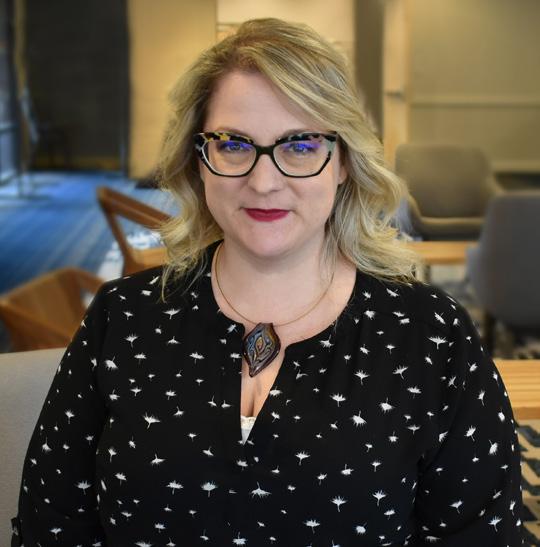
3 minute read
Second Acts
Paydac
Shortly after Jim Nelson retired from the local Fleet Farm retail store a halfdozen years ago, he called longtime friend Phil Johnson, owner of Paydac Plastics, to check out possible part-time gigs. Nelson’s retirement had flourished during the many summer activities that Fergus Falls had to offer, but the winters were another story. “I don’t snowmobile anymore, and I just wondered what I was going to do with myself,” he says.
Advertisement
Johnson saw an opportunity. He hired Nelson to fill in for an employee experiencing a long-term medical issue, and another was enjoying an extended visit with family in California.
“It worked out pretty well,” says Nelson, who continues a happy employment with Paydac.
It worked for Johnson, too. What started as a favor to help a buddy relieve the housebound tedium of a Fergus Falls winter has evolved into a surprisingly effective low-tech complement to Johnson’s plan to automate his operation in the face of the ongoing diminution of available workers.
About a third of Johnson’s 20-person operation already consists of part-time retirees; he expects that percentage to rise to 50%.
Johnson says his “retiree” strategy serves mainly as a precaution against possible future worker shortages, not because he faces any current challenges of recruiting and retraining workers. “It’s not a concern for us,” he says. “A few people have quit over the years, but almost never because they were disgusted with the job. It’s usually that they found something with better pay.”
He attributes Paydac’s high HR stability to a company spirit that treats employees as extended family. “We never call them employees,” he says. “It’s a very familyoriented company, and we want their work to be rewarding for them.”
The influx of older employees, Johnson says, has only enriched that culture. “You can’t beat their work ethic,” he says. In fact, he occasionally needs to persuade some of his repurposed retirees to take time off. “They’re retired,” he continues. “We understand if their grandkids have a school play at noon, we want them to go, whatever it is. Just let us know.
“Most of them are used to working a 40hour work week,” he adds. “They think, ‘If I’m dependable, I better be there.’”
Phil and his wife Teresa founded Paydac in 2001 on the site of a nearby abandoned creamery that they had purchased as a prospective real estate investment. After selling off his family’s dairy operation in
1996 — “Farming is a great way to live but not a very good way to make a living,” he says — Johnson had been working for a local plastics company but was ready for another challenge. One emerged when a company near the Twin Cities offered him a contract to regrind scrap plastic into a reusable commodity. He accepted the offer, even before he and Teresa had closed on the creamery property. He bought some equipment and spent several grueling months working eight-hour days for his employer and then eight more hours for his new project.
The original project that called for regrinding 20,000 pounds of material quickly became 60,000 pounds; the profits paid for the machinery he bought to do the job and inspired him to establish Paydac Plastics. “It just made sense to move forward,” he says.
Paydac specializes in custom plastic injection molding. Johnson can trace much of his company’s steady growth toward today’s $2.4 million in revenue to a relationship forged in 2003 with StoneL, a local valve manufacturer today owned by Valmet, a Scandinavian conglomerate. Johnson estimates that Valmet constitutes up to 90% of Paydac’s revenue.
Paydac molds 100% of the parts for Valmet’s Fergus facility, which has always kept his plant humming. “There were years when it was all we could do to keep up to their growth,” Johnson says. With just a 10-minute drive between facilities, Paydac maintains a seamless supplier relationship that would make Toyota proud.
“It works unbelievably well,” he says. “For the most part, we’re in tune to what they need and when they need it.”
Johnson plans to keep pace with his customer’s demand through the efficiencies of automation. “We don’t want to add it just to add it,” he says, “but there are real benefits. We want people to be able to do more work without having to work harder.”

Despite the supply-chain challenges in 2022, Johnson added two machines with robotic components and plans to make other purchases. “My biggest challenge is to navigate that process.”
One new machine enables Paydac to efficiently process a project solely in the Fergus plant, where it previously involved boxing and shipping crates to and from the still-operating facility in Elizabeth. The robotic equipment eliminated travel time, cut production time in half, and provided greater per-piece accuracy.
“We eliminated one operator for that job, which means we’ve got that operator doing something else,” he says. “That one job will pay for the machine.”
Finding automated equipment can still be a challenge, and Johnson himself takes on the programming work after receiving significant schooling from salespeople.
“They’re making programming much simpler nowadays,” he says. “There’s no way I’d have been able to program some of the original robotics.”
—Tom Mason










